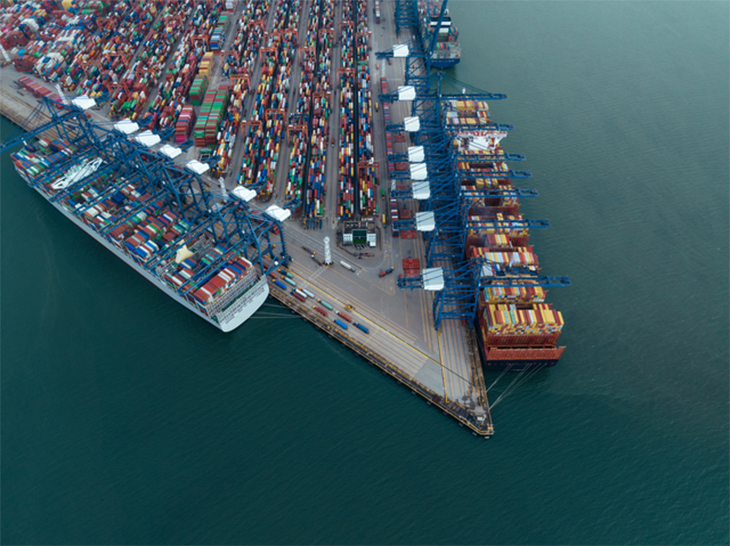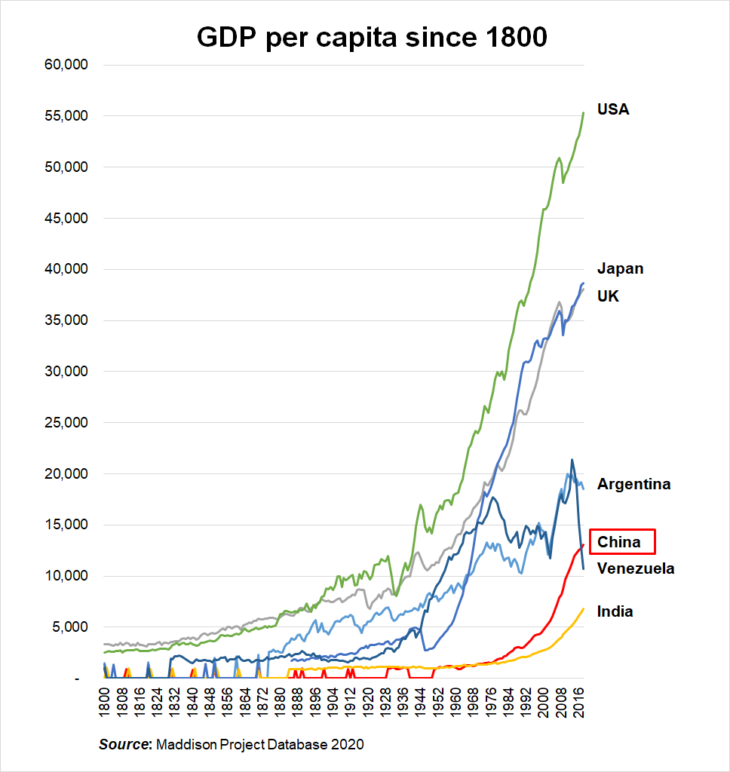China’s Economy Continues to Struggle: The Leadership Declines Creative Destruction

China’s economy continues to struggle. The future course of the Chinese economy will depend on the choices made by China’s political and economic systems.
Photo: Yantian International Container Terminals, Shenzhen, China, lzf / PIXTA
Watanabe Mariko, Professor, Gakushuin University
Key points
- Deng Xiaoping achieved rapid growth by destroying vested interests
- The current administration prioritizes national security at the expense of openness to the outside
- The strategy increases burden against their own costs

Prof. Watanabe Mariko
The National Congress of the Chinese Communist Party is held in China this autumn. The future course of the Chinese economy will depend on the choices made by China’s political and economic systems. This article provides a bird’s-eye view while referencing the discussion about the relationships between economic growth, institutions, and technology choices in a political economy.
◇ ◇
China is the world’s second largest economic power, but GDP per capita has still not reached the levels of developed countries. According to economic growth theory, if a country has the same institutional environment [as developed countries], the lower the income level of the economy, the higher the growth rate because the marginal productivity of capital is greater, bringing about relatively rapid economic growth and catch-up at a given point.
The figure indicates that the United States and Japan have kept up with the growth trajectory of Britain. Argentina and Venezuela are off the trajectory while China and India are still in the process of catching up.
Aiming to complete the catch-up, China is developing its institutions. As long as the country makes appropriate decisions, it has the potential to maintain higher economic growth than developed countries.
What constitutes appropriate decision-making? Professor Barry R. Weingast of Stanford University presented the concept of the dilemma of centralized authoritarian rule. To achieve economic growth, the state must have the ability to guarantee property rights and to enforce contracts to implement appropriate technological choices and profit distribution, but the dilemma is that this ability is so strong that the state can even seize the property of its citizens. If the state loses sight of this balance, there will be no economic growth.
Professor Daron Acemoglu of Massachusetts Institute of Technology (MIT) and Professor James A. Robinson of the University of Chicago classified failing states whose economy has collapsed into two types: one is a state that fails to centralize power and the other is an absolutist state that declines creative destruction and clings to its own political foundations. If we take this idea a step further, even the absolutist state is capable of economic growth as long as it is able to embrace the creative destruction.
In short, whether or not China can catch up with the growth trajectory of developed nations depends on whether the country is able to control the dilemma of centralization and economic growth by choosing to embrace the creative destruction that transcends the interests of its own political base. In this age of increasing globalization, the issue has become a trilemma of economic growth, opening up and centralization.
When Deng Xiaoping implemented reform of the economic system and the opening up to the world of China, the move was accompanied by the destruction of the interests of the state-owned companies that formed his political base. As a result of embracing creative destruction through opening up, he delivered a high level of economic growth.
After the formation of the Xi Jinping leadership, on the other hand, national security has been a top priority. The National Security Law enacted in 2015 lists not only territorial, resource, and civilian security, but a wide range of national security issues to be protected, including the maintenance of the current administration, economic development, and national sovereignty over data.
How is the current leadership dealing with creative destruction? Within China, the leadership is trying to maintain economic growth, but at the expense of opening up, which they view as a threat to their own political base. As a result, they are saddled with the additional and increasing costs of maintaining their own economic security.
For example, it is domestic policy to secure economic growth without harming economic welfare (satisfaction in society as a whole). The order in November 2020 to delist the Ant Group, a financial company associated with the Alibaba Group, marked the start of tighter regulations for platform companies. The regulations include financial regulation, competition policy regulations, and data safety regulations.
The reason for the order to delist the Ant Group was to prevent excessive risk-taking when providing credit. In order to maintain consumer welfare and competition, Alibaba and Tencent Holdings were ordered to remove the blocking facilities that ban access between Alipay and WeChat Pay, their respective mobile payment platforms.
In addition, data transfer across the border emerged as a new problem. The Chinese Communist Party is seriously concerned with data safety The mobility technology platform DiDi had completed its stock offering in the United States, but decided to delist as a result of government regulations.
The Five-Year Plan also incorporates a broad range of policies to stimulate economic growth. Launched in 2021, the 14th Five-Year Plan [2021–2025] presents a comprehensive blueprint of areas with the potential to become focal points of future growth.
The regulations targeting zombie firms outlined in the 13th Five-Year Plan [2016–2020] are gone. On the other hand, the 14th Five-Year Plan sets out policies that aim to build industrial clusters of advanced manufacturing industries by merging industries such as the new generation of information technology (IT), biotechnology, new energy, environmental protection, aviation and aerospace, marine installation and other industrial upgrades, internet, big data, and artificial intelligence (AI).
To support such new industrial development, China will strengthen regulation over the competition policies arena and establish institutions aimed at building a data trading market, one of the most advanced attempts in the world at this moment. Presenting this blueprint may induce aggressive investment by the private sector, including foreign capital, which will have ripple effects beyond the support provided by subsidies alone.
◇ ◇
On the other hand, China still harbors doubts about opening-up. In the very short term, the impact of the response to the COVID-19 pandemic has been significant. Missing the timing to introduce vaccines from abroad by fixating on its own technologies means that the lock-down of cities and borders cannot be stopped.
As for long-term institutional choices, the Regional Comprehensive Economic Partnership (RCEP), which China joined, entered into force in 2022. In September 2021, China applied to join the Comprehensive and Progressive Agreement for Trans-Pacific Partnership (CPTPP), and the country has also expressed willingness to be actively involved in reforms at the World Trade Organization (WTO). However, there is no sign that China is willing to move forward with the creative destruction evident at the time it joined the WTO.
For example, to what extent is it permissible to stop the cross-border transfer of data for security reasons? The RCEP allows countries to independently define the scope of security exceptions, but the CPTPP does not allow countries to define their security exceptions or excessive regulation beyond the purpose. However, at present, China’s guidelines for the transfer of automotive industry data impose excessive restrictions on foreign companies, and China has not expressed any willingness to abide by the CPTPP requirements for improvement.
In addition, the imposition of economic coercion against countries with which there is political friction, prohibited by the Agreement on the Application of Sanitary and Phytosanitary Measures and Agreement on Technical Barriers to Trade, has emerged. This has been done intermittently. Similar measures were taken against Taiwan on the occasion of the visit of the US Speaker of the House of Representatives, Nancy Pelosi, to Taiwan. Recently, Australia and Lithuania, which have been subjected to economic coercion, filed a complaint with the WTO.
Increased wariness of the current leadership and more conflict in a rule-based world, and rising political pressure outside the rules are the results of acts that do not respect the rules a country has signed up to.
China today is so concerned with its national security that it refuses to engage in the creative destruction that external rules demand. As a reaction against the excessive orientation toward power, China should be aware of the additional costs the country will incur in the world of trade and investment.
Japan should not be dragged into one-on-one power games, but concentrate on maintaining a good environment for the international rule of law. Japan should also make full use of the power of positive externalities (influence) to discipline China’s actions through rules widely imposed on the 164 WTO member countries and regions.
Translated by The Japan Journal, Ltd. The article first appeared in the “Keizai kyoshitsu” column of The Nikkei newspaper on 7 September 2022 under the title, “Kukyo tsuzuku Chugoku keizai (III): Shidobu, ‘sozotekihakai’ ni shincho (China’s Economy Continues to Struggle (III): Leadership Cautious about Creative Destruction).” The Nikkei, 7 September 2022. (Courtesy of the author)
Keywords
- Watanabe Mariko
- Gakushuin University
- China
- economic growth
- growth trajectory
- leadership
- power politics
- decision making
- GDP
- creative destruction
- vested interests
- opening up
- centralization
- Five-Year Plan
- data trading market
- RCEP
- CPTPP
- WTO
